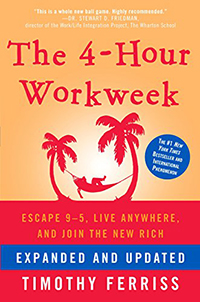
Hi, I’m Stephan Spencer. I have here with me today, Tim Ferriss. He’s a guest lecturer in high-tech entrepreneurship at Princeton University and author of the New York Times bestseller, The 4-Hour Workweek. Welcome, Tim!
Thanks for having me!
Tell me a bit about your background-how did you get started in this area that you’re in of personal productivity? You also have a couple of businesses so tell me about those and about your book.
Sure! Well, the funny thing is, I never had any intention of writing this book. I attended Princeton as an undergraduate, focusing first on neuroscience then on linguistics. Following that, I came to Silicon Valley in 2000. A friend of mine sold a company called BlueMountain.com-some people may have heard of that-for somewhere along the lines of $480-million so it seemed like a good idea to go to Silicon Valley. I worked first as an employee and then as founder of my own startup in Silicon Valley until mid-2004. My startup had two branches. One was pharmaceutical design so looking at how a number of biochemists whom I contracted could identify and even design compounds that could then be licensed to big pharmaceutical companies and then the second side of that was, over-the-counter sports nutrition products aimed primarily at elite athletes, not so much at the mass market. Those are my two businesses-or the one business with two different facets to it.
In mid-2004, I was putting in say, 80-90 hours per week. The company had distribution to 15 countries and is financially very successful but I had no time. I decided to take a step back and really reassess both my use for resources and my own goals by going to London for, what I expected to be, four weeks to decompress and I set a rule for myself during that four-week period and that rule was that, I would check email once per week-once every Monday-and this was a huge detox for me since I had been checking 1-200 times per day prior to that-that’s not an exaggeration. I’ve been sleeping under cubicles and then later, sleeping in my office and I expected the company could very well fail without my constant management and I’ve accepted that if the company couldn’t coexist with my life, I was willing to sacrifice it. Instead, within four weeks, the profits at the company went up close to 30% once I really redesigned the company and cut the fat so that I was no longer a bottleneck for the solution and information flow.
That was really the first experiment that opened my eyes to how unfounded and just patently false most of my assumptions were about work life, career, and entrepreneurship. I ended up traveling around the world for 15 months seeing how far I could push the concepts of outsourcing and automating my business as well as outsourcing and automating my life and I was teaching one of my Princeton classes from Buenos Aires where I was training for the world championships in tango, which is a whole separate saga. One of the students jokingly said, “Well, I don’t understand why you don’t just put all this into a book ha-ha-ha!” and that idea stuck in my brain and now, two years later, here we are.
I ended up traveling around the world for 15 months seeing how far I could push the concepts of outsourcing and automating my business as well as outsourcing and automating my life.
Wow, that’s incredible! So, you unchained yourself from this urgency addiction that you had with constantly checking emails, constantly being on-call with your businesses, and made yourself no longer indispensable but just available as needed. From there, you kind of re-architected your own life and your business to make yourself more productive and a book came out of this so it sounds like a great story. Tell me a bit about this process of outsourcing more and more of your life. How does that work?
Outsourcing could almost be used synonymously with delegation here so the first step is really calculating the value of your time and annual income is a very deceptive number that people use to justify unsustainable workloads. They may get a raise from, let’s say, $50,000- $75,000 but they might be putting in 30 or 40% more hours so their relative income or, as I call it, their hourly earnings are actually less and that is completely unscalable. What I encourage people to do is to really sit down and determine their per-hour earnings so if you make $50,000 a year, this is an example, you cut the last three zeroes off and divide that remaining number 50 in half and you get 25 so you make $25 an hour. If you can take time-consuming tasks, unpleasant tasks, or simply boring tasks both in your professional and personal life, consider delegating them to someone else.
Just as one example, if you can find someone, let’s say, to compile excel spreadsheets for you for $12.50 an hour, if you make $25 an hour, that’s an immediate 100% return on investment-not to mention what you were able to do with the time you free for yourself. I started with business tasks so my entire company in the United States is a virtual architecture so from products sourcing to manufacturing to actual quality assurance, shipping, customer service, regulatory affairs, and accounting, all those things are done in different states, believe it or not, and as an example of domestic outsourcing for business, I began outsourcing administrative tasks like prospecting or if I want to create-this is one example for the book-an excel spreadsheet where I would have a target of 300 blogs and those 300 blogs would have election rankings in one column, they would have incoming links in another column, and then they would be organized by tags on technical writing so you might have productivity, you might have time management, you might have personal finance, and for me to compile something like that would take well over 100 hours.
I was able to assign that to people in Bangalore for four dollars an hour and assigned it one day at 5 P.M. and then come in the next day and have it in my inbox at 9 A.M. so that would be just one example of a business task but you can really take it to extremes and extreme only in the sense that people haven’t really been exposed to them before. I mean, everything from travel arrangements to having, essentially, a digital concierge who’s on call 24/7 for you, you can do all these things very cost-effectively and that can range from getting an American Express platinum card and using their concierge service, which I do, which is very flexible and people don’t realize, all the way from hiring an army of MBA’s in India or the Philippines so there are many different options available for every comfort level and price range.

How would somebody who is, say, a marketing director or a marketing assistant-how would they outsource aspects of their job or their life to improve their productivity and the amount of income that they’re earning?
Sure! The first thing you need to do is to do a time audit and what I mean by that is, you’re going to take the 80-20 analysis or the 80-20 principle, which some people are familiar with, which essentially dictates that 20% of your activities produce 80% of your desired outcomes and where we’re going to plot instead is time so what are the 20% of activities that consume 80% of your time? If those activities can be done in front of a computer or from a phone, they can be delegated to someone who costs much less than you were in per hour. The range is quite broad but I’ll give you an example of a brick-and-mortar application-I was recently on a consulting call and spoke to a woman who runs about half a dozen large hotels. She was wondering how she could use outsourcing and I asked her what her highest priorities or to-do items on her list were that have been on the list for some time. She said that competitive analysis was one of those.
There was a particular competitor in her industry who for unknown reasons was booking their hotel solid and she couldn’t discern why that was so you could hire four or five people, let’s say, with MBA’s in India and I just use India as an example because they have a very well-developed service industry for this type of thing. You could have them do 30 hours of online analytics trying to identify what this hotel is doing even coming through LexisNexis and things like that and that would cost you $120 if they did 30 hours of work and then compile the report with suggestions and recommendations. That would be just one example but really, anything that can be done in front of a computer or on the phone can be delegated if you find the right person and of course, that is the big challenge-how do you identify the appropriate person to actually outsource to?
Right. So, what’s the secret there?
The secret is really no different from hiring in the sense that in my personal process, I have a number of rules that I follow. The first rule that I follow is, I never hire a single individual for outsourcing certain functions. I don’t like single points of failure so if someone gets sick or disgruntled or gets fired or quits, I don’t want to have a project fall through because of that. I will look for specific virtual assistant groups, that’s a very common term for this type of person because this type of function is a virtual assistant or a VA. There are specific companies that focus on this type of work like GetFriday.com, which is one such group based in India but they also have locations in the United States so you can actually work with them both during your workday and then, they can work for you while you’re sleeping or doing something else after hours. That would be an example of such a group.
I never hire a single individual for outsourcing certain functions.
If you go through, let’s say, Elance so you can go to Elance.com, I’ve used them for a number of different projects, you can post your project and specify that it’s for a virtual assistant or group of virtual assistants, and you’ll probably receive between 20 or 30 proposals, and immediately delete any boilerplate-form responses. What I’ll do then since the cost is usually very low and even if it isn’t is, I’ll assign-and oftentimes, they’ll do this for free-let’s say, a 20 to 30-minute task to the top 3-5 candidates. I test reliability before I test the skill set. I don’t care how technically-able someone is if they’re not going to do their work on time and meet deadlines so I’ll assign something very easy but it will have a very tight turnaround of deadline-that will usually eliminate at least 50% of them. From that point on, let’s say, you have a project that you insist that they would take 20 to 30 hours, you just assign the task to, let’s say, all three, ask them to stop after three hours, and send you whatever they have at that point in the form of a report. It sounds very time-consuming when I explain it verbally like this but it’s a very fast process. I mean, this is something that you can do within 30 minutes of receiving your initial batch of proposals.
How do you ensure that the person whom you have then chosen from this process actually follows through with the project? You make sure that you give them a good brief and so forth because I would imagine that there are a lot of to-do’s on each of our list and to our listeners’ list that are just not that easy to delegate and seem like they would take as much time to prepare a proper brief explaining what to do than it would be just to do it yourself. I mean, that’s kind of the reason why so many people don’t delegate-it’s because they feel like it takes just as long to explain it as to do it.
Well, I mean, there are certain tasks that are faster to perform yourself. I mean, if you’re going to simply book a flight from LA to New York and you know which airline you’re going to use, it makes more sense for you to jump on to Orbitz and do that in five minutes than to write out a brief to delegate it. However, if it’s a repetitive task and even if it is a one-time task, I would actually argue that even if you don’t have the need for a virtual assistant whom you use to delegate certain tasks that have been on your to-do list for a long time-now, why do I say that? Because I think we assume that we can’t delegate ‘Project X’ because it takes us a long time to describe it but I think that pinpoints the issue. I think the reason that it’s on our to-do list and not on our completed list is because we haven’t defined exactly what we need to do. That’s what I’ve encountered.
When you have a task that is important but you haven’t defined the steps and the outcome very clearly, it never gets done and it stays on the to-do list. By hiring a virtual system, you’re forced to describe exactly step-by-step what they need to do, which, in turn, even if you don’t hire them turns into your to-do list and your process for getting done. I think that the secondary to that or actually, probably, even primary is, realizing that if you have 20 or 30 things on your to-do list, you’re not prioritizing properly-in the sense that, the reason that I didn’t have very much time and the reason most people don’t have much time is that they don’t prioritize effectively. Because we have, let’s say, a nine-to-five schedule, which is really arbitrary in a global economy in many senses, we strive to create activities to fill that time whether or not they’re important. The first step is really using the 80-20 principle in the traditional sense of looking at our to-do list and asking ourselves, “If this were the only thing I did today, would I be satisfied with my output?” and going down the list, really taking those maybe one or two things, putting them at the top, and doing those first. Then, if there are other like to-do activities that are time-consuming, delegate those to someone who you can pay less than you in per hour.
When you have a task that is important but you haven’t defined the steps and the outcome very clearly, it never gets done and it stays on the to-do list. Share on XMm-hmm. What sort of things would you suggest not outsourcing to an army of MBA’s or whoever?
There are certain things that I don’t outsource and I don’t outsource them primarily because either (1) I enjoy doing them, even if they are time-consuming, or (2) It just requires a high-level of English proficiency, which is hard for me to replicate overseas. That doesn’t mean you can’t delegate to someone in the US, in the UK, in Australia, New Zealand, or some native English-speaking country but there’s a very big difference between grammatically-perfect English and idiomatically-correct English with all the nuances. I keep all of my high-level marketing decisions and budgeting decisions in house so which magazines I’m going to advertise through and doing the actual back-end analytics.
I keep for myself the creative decisions about whether that’s print advertising or radio or anything else, which I’ll also keep in house because that’s something that I enjoy as well is the copywriting. I enjoy the copywriting so I will do the copywriting myself but if there’s any type of analysis required that doesn’t have a creative element that I enjoy so if it’s simply tweaking pay-per-click campaigns, let’s say, going in and adjusting paper bids, terms, and so forth on a two-week or four-week basis, that’s something that I would outsource. However, there are very few limitations and there are, surprisingly, few tasks that can’t be outsourced.
I know this isn’t entirely relevant to our conversation but just to prove this to a friend of mine, recently, I was drinking some wine with a friend of mine-I’m in Napa, near Northern California, so we drink a lot of wine here-the bet was that I couldn’t outsource my dating life and I’ve effectively outsourced all of my online dating for four weeks. My friend said that there are certain things you just can’t outsource and I said, “Like what?” and he said, “Dating,” so I took him up on that and I won my bet. I had about 50 dates, which I couldn’t even pull off on my own so it’s depressing and enlightening at the same time. There are very few things that you can’t delegate to someone else if you define them very, very precisely. If you do not define things very clearly, it will prevent you from delegating.
Sure, sure. You mentioned copywriting as something that you don’t outsource. I’ve actually found that by having someone draft the first draft for me, it kind of gets past this mental block that I have when I get too hung up on the details. I’m too much of a perfectionist, I guess, when it comes to writing-whether it’s a blogpost or articles-so what I do is, I dictate my article or blog post to an assistant who writes it down in shorthand. She then logs into WordPress if it’s a blogpost, saves it as a draft, makes whatever edits to it to improve the readability, and so forth. If it’s an article, she’ll write it up in Microsoft Word and send me the word document. I find that to be a hugely liberating thing to have something to work with. It’s so easy for me just to ramble off and come up with something that’s really rough but then, I end up receiving it, a day later, in a word document. I think, even copywriting, if you have somebody who’s proficient with English and in this case, this woman is based in the same city as me and I actually have her come into my office to meet with me but I would think that that could be somewhat harder to replicate dealing with somebody overseas.
Oh, absolutely! When I say copywriting, I usually mean actual product sales copy so my book, I wrote myself. The book is something that I really wanted for just the psychological and emotional gratification I wanted to do that myself. However, for blog post research for, let’s say, moderating comments on a blog, for any type of forum moderation, or anything like that can be outsourced. And as far as writing goes, I agree 100%. When we were developing-when I say “we”, I mean, people involved with this book so Random House and several publicists whom I’m working with-when we are preparing for the launch, I had them draft a lot of the first press materials because I was too close to the material and I’m sure you know what I mean. When you’re surrounded by a product, a book, a concept, or an idea for too long, you’re too close to the material to really-I think-present it to someone who hasn’t been that close so it’s very helpful to have someone else, like you said, to put together a draft and then you’ll say, “Wow, okay, this, this, and this is really off-mark but these few things that you just came up with are excellent. Genius!” Certainly, that’s a perfectly viable option. It just requires that you pick your VA or the person you’re delegating to more carefully based on their English proficiency.

Mm-hmm. Now, your presentation at the Web 2.0 Expo was titled Mastering the Low-Information Diet, and one of the things that you recommended in that presentation was to not try to keep up so much with all the innovations and so forth in your field because you can’t possibly keep up with everything. How do you outsource or do you outsource aspects of kind of keeping up with the industry with the innovations with what’s happening out there?
There are few responses to that. The first is, I know people who actually have their outsourcers essentially compile executive summaries of the various magazines, trade journals, and etcetera they want to keep up with or, at the very least, sift, sort, and select the most relevant and actionable articles and pieces of information so that would be one use. I actually don’t do that. What I do these days is, I tend to limit my core competencies so much to just two or three activities that I focus on that I will actively hire people who I know are keeping up with their specific domain of expertise. I am not an expert in search engine optimization because it’s something that you really need to be dedicated to. I have other areas that I feel are my strengths so I will go out and I will hire somebody who is an expert in search engine optimization and it’s their job to keep up-to-date with all of various developments, algorithm changes, etcetera. However, I really think that developing this selective ignorance and following a low-information diet is key to being good at anything. It’s really looking at delegation and partnering so that you surround yourself with other people who are sifting and assimilating information rather than depending on yourself to do it all.
Mm-hmm. That makes total sense!
Being new doesn’t necessarily make it good. So really separating new from valuables are key to develop.
The last thing I would say is, and I know that this may run counter to what a lot of people think but there aren’t that many things that are new in certain fields. I think that, because we have magazines and other vehicles for conveying information, there’s a need to fill them with some type of newness but if you want to learn about advertising or copywriting, I mean, you could pick up Hopkins, or you could pick up Cables, you could pick up some of these books from the 1930’s or 1920’s and would probably do you a lot more good than trying to keep up with every fatter trend in Ad week or PR week, let’s say. I think that something being new-just like something being technologically advanced, doesn’t necessarily make it good so really separating new from valuables are key to develop.
Yup, absolutely! Now, last question for you, any sort of big mistakes or faux pas that your army of outsourcers have made that wouldn’t have happened if you would have done it yourself?
You know, there really haven’t been any. Every major mistake-and when I say “major,” that means it cost me $150 so we’re not talking about any mission-critical errors here. I’ve been very clear with what I focus on with my core competencies and what can be outsourced so I haven’t had any big mistakes and this has been several years now that I’ve been doing this. The only mistake that I made, which resulted in errors on the other side of the fence, was not asking for updates very soon after the task has been assigned. This is as important with English speakers as it is with non-native English speakers. When you assign a task, make sure that they confirm and that they understand the task by paraphrasing it back to you, number one.
Number two is, if it’s a task is going to take 20-30 hours or even, 10 hours, have them do 2-3 hours of work and then report back with what they’ve done in their findings and results so far. It’s because you want to make sure that number one, it’s not an impossible task and sometimes, we have a habit of doing that. It will just take something that’s absolutely impossible and awful at someone else because it’s too poorly defined or, you want to make sure that they have understood what you want them to do and there’s nothing lost in translation. Really having people follow up with you to report on progress like, 2-3 hours into it with most projects is critical. One of my first VA experiences was, I assigned a task and I wanted them to set interviews but they were interviews for the book and they thought I meant job interviews so it’s just that one small piece of clarification that ended up getting the spreadsheet that I couldn’t use at all. It was completely useless but it was because I didn’t ask them to confirm if they understood what the task actually entailed.
When you assign a task, make sure that they confirm and that they understand the task by paraphrasing it back to you.
However, no big mistakes, no big problems, and the people I’ve spoken to, generally, the only time that they’ve really shot themselves in the foot is when they’ve depended on one virtual assistant and that person, let’s say, become sick so I spoke to one woman who went on vacation for the first time in five years-she finally had managed to find a right-hand woman who was handling most of her administrative work and then, when she was in the airport, on her way to a vacation destination, she received a phone call that our VA was out sick. She had to spend the entire vacation doing work and that’s not limited to virtual assistants though-that’s limited to hiring, in general. I’ve seen the same thing happen to people who have executive assistants in the US so really hiring a support team or a group of people as opposed to one person to avoid that single point of failure. That would be the only other precaution that I would give people.
Great! Well, I really appreciate your time. Thanks for joining us here, Tim. Tim is a guest lecturer on high-tech entrepreneurship at Princeton University and author of the New York Times bestseller, The 4-Hour Workweek. Be sure to check it out! Thanks, Tim. Thanks for joining us!
Thanks so much. My pleasure!
Important Links
Connect with Tim Ferriss
Organizations/Companies
Book











